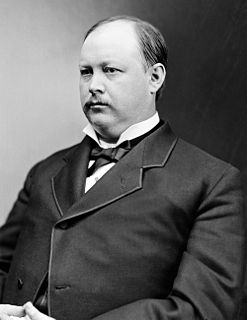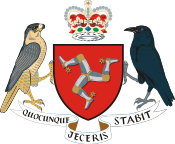
The government of the Isle of Man is a parliamentary representative democracy. As a Crown Dependency, it is not subordinate to the government of the United Kingdom. That government, however, is responsible for defence and external affairs and could intervene in the domestic affairs of the island under its residual responsibilities to guarantee "good government" in all Crown dependencies. The Monarch of the United Kingdom is also the head of state of the Isle of Man, and generally referred to as "The Queen, Lord of Mann". Legislation of the Isle of Man defines "the Crown in right of the Isle of Man" as separate from the "Crown in right of the United Kingdom". Her representative on the island is the Lieutenant Governor of the Isle of Man, but his role is mostly ceremonial, though he does have the power to grant Royal Assent.

The Canadian federal election of 1921 was held on December 6, 1921, to elect members of the House of Commons of Canada of the 14th Parliament of Canada. The Union government that had governed Canada through the First World War was defeated, and replaced by a Liberal government under the young leader William Lyon Mackenzie King. A new third party, the Progressive Party, won the second most seats in the election.

The 1918 United Kingdom general election was called immediately after the Armistice with Germany which ended the First World War, and was held on Saturday, 14 December 1918. The governing coalition, under Prime Minister David Lloyd George, sent letters of endorsement to candidates who supported the coalition government. These were nicknamed "Coalition Coupons", and led to the election being known as the "coupon election". The result was a massive landslide in favour of the coalition, comprising primarily the Conservatives and Coalition Liberals, with massive losses for Liberals who were not endorsed. Nearly all the Liberal MPs without coupons were defeated, although party leader H. H. Asquith managed to return to Parliament in a by-election.
There have been various groups in Canada that have nominated candidates under the label Labour Party or Independent Labour Party or other variations from the 1870s until the 1960s. These were usually local or provincial groups using the Labour Party or Independent Labour Party name, backed by local Labour Councils or individual trade unions. There was an attempt to create a national Canadian Labour Party in the late 1910s and in the 1920s, but these were partly successful. The Communist Party of Canada, formed in 1921/22, fulfilled some of labour's political yearnings from coast to coast, and then the Co-operative Commonwealth Federation - Worker Farmer Socialist" was formed in 1932. With organic ties to the organized labour movement, this was a labour party by definition.

The 1978 United States Senate elections in the middle of Democratic President Jimmy Carter's term. Thirteen seats changed hands between parties. The Democrats at first lost a net of two seats to the Republicans, and then one more in a special election. Democrats nevertheless retained a 58-41 majority.

Elections in the British Virgin Islands are conducted to elect members to the House of Assembly. In the British Virgin Islands elections are not conducted in relation to appointments to either the Executive or Judicial branches of Government, and there are no other publicly elected posts in the British Virgin Islands. Most elections are conducted as general elections, which under the Constitution are required to be held every four years, or as by-elections when a member of the House of Assembly dies or steps down. Since the re-introduction of democracy into the British Virgin Islands in 1950 there have been fifteen general elections, and three recorded by-elections. The next general election is scheduled to be held in 2015.

Elections to the United States House of Representatives held in 1888 were held to choose members of the 51st Congress, and were held at the same time as the election of President Benjamin Harrison.
The Isle of Man partially elects its legislature at the national level. The High Court of Tynwald consists of two chambers. The House of Keys has 24 members, elected in a general election for a five-year term in 12 two-seat constituencies. Each voter has two votes and in each constituency the two candidates with the most votes are elected. The Legislative Council has 11 members: three ex-officio members and eight other members who are elected by the House of Keys for a five-year term. Political parties do not play an important role on the Island. The Isle of Man lowered its voting age from 18 to 16 in 2006.

The Liberal Vannin Party (LVP) is a political party on the Isle of Man. It was founded in 2006 by Peter Karran, then an Independent MHK for Onchan. Karran had been, until 2004, a member of the Manx Labour Party.

The 1919 Australian federal election was held on 13 December 1919 to elect members to the Parliament of Australia. All 75 seats in the House of Representatives and 19 of the 36 seats in the Senate were up for election. The incumbent Nationalist Party government won re-election, with Prime Minister Billy Hughes continuing in office.
The University of Wales by-election, 1943 was a parliamentary by-election held in the United Kingdom between 25 and 29 January 1943 for the House of Commons constituency of University of Wales.
Middlesex County Council was the principal local government body in the administrative county of Middlesex, England from 1889 to 1965.
Walter Clucas Craine was a politician and trade unionist from the Isle of Man. He was a long-time Member of the House of Keys and the first Labour mayor of Douglas. Outside politics he worked as a baker, commercial traveller and insurance agent.

General elections were held in the Isle of Man on 22 September 2016. Independents won 21 of the 24 seats in the House of Keys. A record number of women were elected.

General elections were held in the Isle of Man between 28 October and 6 November 1924. Independent candidates won a majority of seats in the House of Keys.

General elections were held in the Isle of Man between 7 and 15 November 1929. Independent candidates won a majority of seats in the House of Keys.

General elections were held in the Isle of Man between 23 and 29 November 1934. Independent candidates won a majority of seats in the House of Keys.













